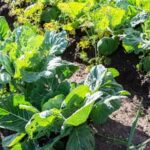Effective pest control is essential for the success of any vegetable garden. It not only protects your precious plants from harmful pests but also ensures a healthy and bountiful harvest. In this article, we will delve into the world of pesticides and explore the best options specifically designed for vegetable gardens.
Vegetable gardens are incredibly susceptible to various types of pests, including insects, diseases, and weeds. These pests can wreak havoc on your crops, causing stunted growth, reduced productivity, and even complete crop failure. To prevent such disasters and maximize the yield of your garden, it is crucial to have an effective pest control strategy in place.
The first step towards achieving successful pest control is understanding the different types of pesticides available. In this comprehensive guide, we will discuss chemical pesticides, organic alternatives, insecticidal soaps, biological controls, integrated pest management (IPM), and even homemade solutions. By exploring these various options, you can choose the approach that aligns with your gardening principles while ensuring optimal results for your vegetable garden.
Join us as we embark on this journey through the world of pesticides and discover which ones are the best for keeping pests at bay in your valuable vegetable garden. Whether you opt for chemical or organic solutions or decide to experiment with DIY recipes, this article will provide you with all the information you need to make an informed decision and protect your plants effectively.
Understanding the Different Types of Pesticides
Pesticides are a crucial tool for maintaining a healthy and productive vegetable garden. However, with so many options available on the market, it can be overwhelming to know which type of pesticide is best suited for your needs. Understanding the different types of pesticides is essential in order to make an informed decision and effectively manage pests in your vegetable garden.
Chemical Pesticides: Pros and Cons
Chemical pesticides are one of the most commonly used types of pesticides in vegetable gardens due to their effectiveness in controlling pests. They work by killing or repelling insects, diseases, and weeds that can damage or destroy crops. Chemical pesticides are available in various formulations including sprays, dusts, granules, and liquids.
Selecting the Safest and Most Effective Chemical Pesticides for Vegetable Gardens
When choosing chemical pesticides for your vegetable garden, it is important to select products that are specifically labeled for use on edible crops. Look for pesticides that target the specific pest you are dealing with. It is also crucial to read and follow all label instructions carefully to ensure proper application.
Additionally, consider using selective insecticides that only target particular pests while sparing beneficial insects. This helps maintain a healthy ecological balance in your garden. Consulting with local cooperative extension offices or gardening experts can provide valuable recommendations based on your specific region and pest problems.
Proper Usage and Handling Tips to Minimize Potential Risks
While chemical pesticides can be effective tools in pest management, they do come with potential risks. It is important to handle these products with care to minimize any negative impacts on human health and the environment.
To reduce exposure risks, always wear protective clothing such as gloves and goggles when applying chemical pesticides. Avoid applying them during windy conditions to prevent drift onto unintended areas or neighboring gardens. Store all pesticides properly in their original containers out of reach of children or pets. Additionally, be mindful of any pre-harvest intervals and follow the guidelines to ensure safe consumption of your produce.
By understanding the pros and cons of chemical pesticides, as well as taking proper precautions, you can effectively control pests in your vegetable garden while minimizing risks. However, it is also important to explore other options that are more natural and eco-friendly.
Chemical Pesticides
Chemical pesticides are commonly used in vegetable gardens to control pests effectively. However, it is essential to understand the pros and cons of using chemical pesticides before incorporating them into your gardening routine.
One of the primary advantages of chemical pesticides is their effectiveness in eliminating a wide range of pests. Chemical pesticides are specifically formulated to target specific types of pests, ensuring that they are eradicated efficiently. Additionally, chemical pesticides often provide immediate results, offering quick relief from pest infestations. This can be crucial for preventing significant damage to your vegetable garden and ensuring a bountiful harvest.
Despite their effectiveness, chemical pesticides come with some downsides that should be considered. One major concern is the potential health risks associated with exposure to these chemicals. Prolonged or excessive exposure can have harmful effects on human health, as well as the environment.
It is essential to select chemical pesticides that have been extensively tested and approved for use in vegetable gardens. Always follow the recommended usage instructions and take necessary precautions such as wearing protective clothing when handling these substances.
Another disadvantage of chemical pesticides is their potential impact on non-target organisms and beneficial insects. These chemicals may not discriminate between harmful pests and beneficial insects such as bees, ladybugs, or spiders, which play a vital role in pollination and maintaining ecological balance. To minimize this risk, consider using selective insecticides that target specific pest species while avoiding harm to beneficial insects.
When selecting chemical pesticides for your vegetable garden, opt for those that are safe and effective against common garden pests while minimizing potential risks to humans and the environment. Conduct thorough research on different products available in the market before making a purchase. Look for active ingredients that are less toxic but still offer high efficacy against pests.
Proper usage and handling tips should also be followed consistently when working with chemical pesticides in your vegetable garden. Always read and adhere to label instructions carefully, especially regarding dosage rates and application methods. Consider using protective gloves, masks, and clothing to minimize direct contact with the chemicals.
Organic Pesticides
When it comes to pest control in vegetable gardens, many gardeners prefer to take a natural and eco-friendly approach. Organic pesticides offer a solution that is not only effective but also safe for the environment and beneficial insects. This section will explore the best organic pesticides for vegetable gardens, as well as discuss their advantages and limitations.
One of the best organic pesticides for vegetable gardens is neem oil. Derived from the seeds of the neem tree, neem oil acts as both an insecticide and fungicide. It is effective against a wide range of pests including aphids, whiteflies, and spider mites.
Neem oil works by disrupting the feeding and reproductive processes of insects, ultimately leading to their demise. Additionally, it possesses antifungal properties that can prevent diseases such as powdery mildew. To use neem oil, simply mix it with water according to the instructions on the bottle and spray it onto your plants.
Another excellent organic pesticide option is pyrethrin. Pyrethrin is derived from chrysanthemum flowers and has been used for centuries as a natural insecticide. It quickly kills pests upon contact by attacking their nervous system. Pyrethrin is particularly effective against flying insects such as mosquitoes, flies, and moths. Keep in mind that although pyrethrin breaks down rapidly in sunlight, it can still harm beneficial insects if used excessively.
Organic pesticides have several advantages over chemical pesticides. Firstly, they break down more quickly in the environment, reducing long-term impacts on ecosystems. Secondly, they are less likely to develop resistance in pest populations due to their complex chemical composition. Lastly, organic pesticides do not pose significant risks to human health when used correctly.
However, it’s important to note that organic pesticides may have some limitations. They may not be as potent or provide immediate results compared to chemical pesticides. Additionally, their effectiveness can be affected by weather conditions. Organic pesticides also need to be applied more frequently since they break down faster.
Insecticidal Soaps
Insecticidal soaps are a popular choice for controlling pests in vegetable gardens due to their mild yet effective nature. These soaps are made from potassium salts of fatty acids and are designed to target soft-bodied insects such as aphids, mites, whiteflies, and mealybugs. Insecticidal soaps work by suffocating the pests, affecting their cell membranes or disrupting the insect’s digestive process.
Examining the Benefits and Recommended Uses of Insecticidal Soaps in Vegetable Gardens
One of the major benefits of using insecticidal soaps is that they pose minimal risk to beneficial insects such as ladybugs, lacewings, and bees. This makes them an ideal choice for gardeners who want to maintain a balance between pest control and environmental conservation. In addition, insecticidal soaps have a short residual impact, which means that they generally do not persist for extended periods in the environment and do not leave harmful residues on vegetables.
Insecticidal soaps are most effective when used on soft-bodied insects during their early stages of development. Gardeners should carefully monitor their plants for signs of infestation and apply the soap spray as soon as pests are detected. It is important to thoroughly coat both the upper and lower surfaces of the leaves, as well as stems where pests may be hiding.
Best Brands and Ingredients for Easy Pest Management
There are several reputable brands that offer insecticidal soaps specifically formulated for vegetable gardens. One highly recommended brand is “Safer Brand Insect Killing Soap,” which contains natural plant-based ingredients like potassium salts of fatty acids. Another popular option is “Bonide Insecticidal Soap,” which is known for its effectiveness against a wide range of garden pests.
When selecting an insecticidal soap, it is crucial to choose one that has been proven to be safe for use on edible crops. Look for products that are labeled as safe for fruits and vegetables, and always follow the instructions provided by the manufacturer.
It is also important to remember that insecticidal soaps can affect certain plants, especially those with soft or hairy leaves, so it is advisable to test a small area of the plant before treating the entire plant.
Biological Controls
Biological controls offer a natural and environmentally-friendly option for pest control in vegetable gardens. Rather than relying on chemicals or toxins, this approach harnesses the power of nature’s predators to control pest populations. This section will explore the benefits of using biological controls in vegetable gardens, as well as provide case studies highlighting successful methods.
By encouraging beneficial insects and animals to thrive in your garden, you can create a balanced ecosystem that naturally keeps pests in check. Ladybugs, lacewings, and parasitic wasps are just a few examples of beneficial insects that feed on common garden pests such as aphids and caterpillars. Introducing these predators into your garden can help prevent infestations before they become a problem.
One successful method of biological control is companion planting. By interplanting certain plants, you can attract beneficial insects while repelling pests. For example, planting marigolds alongside your vegetables can deter aphids and nematodes while attracting ladybugs. Another effective technique is creating habitat for natural predators, such as providing sheltered areas for birds or encouraging spiders to weave their webs near susceptible plants.
To illustrate the effectiveness of biological controls, let’s take a look at a case study from a vegetable garden in California. The gardener noticed an infestation of cabbage worms on their brassica plants, which were damaging the leaves and reducing yields. Instead of reaching for chemical pesticides, they decided to experiment with releasing trichogramma wasps into the garden.
These tiny parasitic wasps lay their eggs inside the eggs of cabbage worms, preventing them from hatching. After several releases over several weeks, the population of cabbage worms dramatically decreased, resulting in healthier plants and higher yields.
| Beneficial Insects | Pests Controlled |
|---|---|
| Ladybugs | Aphids, mealybugs, mites |
| Lacewings | Aphids, spider mites, thrips, whiteflies |
| Trichogramma Wasps | Cabbage worms, corn borers, tomato hornworms |
| Parasitic Nematodes | Root knot nematodes, cutworms |
Integrated Pest Management
Integrated Pest Management (IPM) is a comprehensive and sustainable approach to pest control in vegetable gardens. It involves the integration of various strategies, such as cultural, biological, physical, and chemical controls, to manage pests effectively while minimizing the use of pesticides. This section will explore the key steps and strategies to establish an IPM program in your vegetable garden.
- Identify and Monitor Pests: The first step in implementing IPM is to identify the pests that are causing damage to your vegetable garden. Regular monitoring and inspection of plants will help you detect any signs of pest infestation early on. Some common pests in vegetable gardens include aphids, caterpillars, beetles, and mites. By identifying the specific pests present, you can then determine the appropriate control measures to take.
- Set Action Thresholds: Once you have identified the pests, it’s essential to set action thresholds for each type of pest. Action thresholds are predetermined levels of pest population at which control measures need to be implemented. The threshold can vary depending on the crop being grown and its susceptibility to certain pests. By setting action thresholds, you can avoid unnecessary pesticide applications when pest populations are below damaging levels.
- Implement Control Measures: In an IPM program, control measures should be implemented in a hierarchical manner, starting with cultural controls before moving on to more intensive methods if necessary. Cultural controls involve practices such as crop rotation, proper watering techniques, improving soil health, and selecting resistant varieties of plants that deter pests naturally.
- Use Biological Controls: Another essential aspect of IPM is utilizing biological controls to manage pest populations without relying solely on pesticides. This involves introducing beneficial insects or animals that prey on or parasitize pests into your garden ecosystem.
- Consider Chemical Controls as a Last Resort: Chemical controls should only be used as a last resort in an IPM program. If non-chemical methods are insufficient and pest populations reach damaging levels, then the judicious use of pesticides may be necessary. However, it is crucial to select the least toxic products that specifically target the pests you are dealing with. Always follow label instructions carefully and use pesticides sparingly.
Some examples include ladybugs eating aphids or birds feeding on caterpillars.
By adopting an Integrated Pest Management approach, vegetable gardeners can maintain a balance between effective pest control and environmental sustainability. It reduces reliance on chemical pesticides and promotes long-term plant health, resulting in healthier harvests for years to come. Implementing an IPM program takes time and effort but is well worth the investment for a thriving and sustainable vegetable garden.
Sources:
- University of California Statewide Integrated Pest Management Program.
- National Pesticide Information Center.
DIY Homemade Pesticides
Homemade pesticides provide a cost-effective and customizable solution for pest control in vegetable gardens. With easily accessible ingredients and simple recipes, gardeners can make their own effective pesticides to target specific pests without breaking the bank. In this section, we will explore some simple recipes and instructions for making homemade pesticides, as well as important safety precautions and tips for their use.
One common household ingredient that can be used to make a homemade pesticide is dish soap. Dish soap contains surfactants that can disrupt the cell membranes of insects, ultimately leading to their demise.
To create a basic homemade pesticide using dish soap, mix one tablespoon of mild liquid dish soap with one quart of water. Transfer the mixture into a spray bottle and apply it directly onto the affected plants, targeting both the tops and undersides of leaves where pests tend to hide.
Another effective ingredient for homemade pesticide solutions is garlic. Garlic contains sulfur compounds that act as natural deterrents for many garden pests including aphids, caterpillars, and beetles. To create a garlic-based spray, blend two bulbs of garlic with one quart of water until it forms a paste.
Strain the mixture through cheesecloth or a fine sieve into a clean container, then dilute it with five parts water before transferring it into a spray bottle. Spray this solution onto the plants every few days or after rainfall to deter pests.
It is important to keep in mind some safety precautions when using homemade pesticides. Always wear protective clothing such as gloves and goggles when handling any type of pesticide, including those made at home.
Additionally, label all containers clearly with the contents inside to avoid any confusion or accidental misuse. Lastly, remember that homemade pesticides may not have undergone rigorous testing like commercial products do, so it is best to spot-test an inconspicuous area on your plants before applying the solution extensively.
Overall, DIY homemade pesticides offer a cost-effective and customizable option for pest control in vegetable gardens. By utilizing common household ingredients and following simple recipes, gardeners can target specific pests while minimizing potential risks. However, it is important to exercise caution and follow safety guidelines when making and using homemade pesticides.
Conclusion – Choosing the Right Pesticides for Your Vegetable Garden
In conclusion, selecting the right pesticides for your vegetable garden is essential for effective pest control and ensuring a healthy crop yield. With the different types of pesticides available, it is important to consider their pros, cons, and specific applications.
Chemical pesticides offer powerful and targeted pest control options, but they also come with potential risks to human health and the environment. When choosing chemical pesticides for your vegetable garden, prioritize safety by selecting products that are labeled as safe for use in edible gardens and following proper usage and handling guidelines.
Organic pesticides provide a natural and eco-friendly approach to pest control. While they may not be as potent as chemical pesticides, they are safer for consumption and avoid harmful effects on non-target organisms. Identify the best organic pesticides for your vegetable garden by considering their effectiveness against target pests and any limitations in their application.
Insecticidal soaps offer a mild yet effective solution for combating insect pests in vegetable gardens. These soaps work by suffocating insects upon contact without harming beneficial organisms or leaving harmful residues. When using insecticidal soaps, select reputable brands with proven ingredients that effectively control pests while also being gentle on plants.
Biological controls harness nature’s predators to manage pest populations in vegetable gardens. By encouraging beneficial insects and animals that prey on pests, you can achieve long-term pest control without relying solely on synthetic chemicals. Explore case studies on successful biological control methods to gain insights into how you can implement these strategies in your own garden.
Integrated Pest Management (IPM) offers a holistic and sustainable approach to controlling pests in vegetable gardens. By combining different pest management techniques such as biological controls, cultural practices, monitoring systems, and targeted pesticide treatments as a last resort, you can achieve balanced pest control while minimizing negative impacts on the environment. Implementing an IPM program requires careful planning and execution of key steps and strategies tailored to the specific needs of your vegetable garden.
For those looking for cost-effective and customizable pest control solutions, homemade pesticides can be a viable option. By using simple recipes and ingredients readily available at home, you can create effective insecticides and fungicides. However, it is important to exercise caution and follow safety precautions when using homemade pesticides to avoid any harm to yourself or the environment.

If you’re looking to get into vegetable gardening, or are just looking for some tips on how to make your current garden better, then you’ve come to the right place! My name is Ethel and I have been gardening for years. In this blog, I’m going to share with you some of my best tips on how to create a successful vegetable garden.





